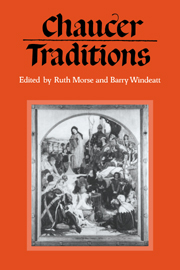Book contents
- Frontmatter
- Contents
- List of contributors
- Preface
- Note on the text
- 1 Chaucer traditions
- 2 Gower–Chaucer's heir?
- 3 Chaucer and Lydgate
- 4 Hoccleve and Chaucer
- 5 Chaucer and fifteenth-century romance: Partonope of Blois
- 6 Some Chaucerian themes in Scottish writers
- 7 The planetary gods in Chaucer and Henryson
- 8 Gavin Douglas: ‘Off Eloquence the flowand balmy strand’
- 9 Skelton's Garlande of Laurell and the Chaucerian tradition
- 10 Chaucerian metre and early Tudor songs
- 11 Aspects of the Chaucerian apocrypha: animadversions on William Thynne's edition of the Plowman's Tale
- 12 The shape-shiftings of the Wife of Bath, 1395–1670
- 13 The genius to improve an invention: transformations of the Knight's Tale
- 14 From the Clerk's Tale to The Winter's Tale
- 15 The Virtuoso's Troilus
- 16 Rewriting romance: Chaucer's and Dryden's Wife of Bath's Tale
- 17 Chaucer's religion and the Chaucer religion
- 18 A list of the published writings of Derek Brewer
- Index
16 - Rewriting romance: Chaucer's and Dryden's Wife of Bath's Tale
Published online by Cambridge University Press: 23 September 2009
- Frontmatter
- Contents
- List of contributors
- Preface
- Note on the text
- 1 Chaucer traditions
- 2 Gower–Chaucer's heir?
- 3 Chaucer and Lydgate
- 4 Hoccleve and Chaucer
- 5 Chaucer and fifteenth-century romance: Partonope of Blois
- 6 Some Chaucerian themes in Scottish writers
- 7 The planetary gods in Chaucer and Henryson
- 8 Gavin Douglas: ‘Off Eloquence the flowand balmy strand’
- 9 Skelton's Garlande of Laurell and the Chaucerian tradition
- 10 Chaucerian metre and early Tudor songs
- 11 Aspects of the Chaucerian apocrypha: animadversions on William Thynne's edition of the Plowman's Tale
- 12 The shape-shiftings of the Wife of Bath, 1395–1670
- 13 The genius to improve an invention: transformations of the Knight's Tale
- 14 From the Clerk's Tale to The Winter's Tale
- 15 The Virtuoso's Troilus
- 16 Rewriting romance: Chaucer's and Dryden's Wife of Bath's Tale
- 17 Chaucer's religion and the Chaucer religion
- 18 A list of the published writings of Derek Brewer
- Index
Summary
This essay begins from two observations about Chaucer made by Derek Brewer: first that his ‘inherited style’ has its roots in the Middle English metrical romances; and second that he so unfailingly ‘derides Arthurian romance’ that it is at least partially true that ‘Chaucer in his poetical character is decidedly anti-romantic’. As a genre, romance hovers uneasily between the vagueness with which the terms roman, romaunt, romaunce were used in the Middle Ages and the backward glare of post-medieval attempts at more exact definition; but I think it unquestionably true that Chaucer regarded what he understood of what we mean by romance with derision; and that in his understanding what chiefly characterized romance was what his contemporary Thomas Usk praised him for avoiding in Troilus and Criseyde: ‘nyceté of storiers imaginacion', foolishness of storytellers’ fantasy – in a word, the unrealistic, the marvellous. This did not prevent Chaucer from writing romances, but led him to experiment with the genre in highly original ways. To put it briefly, in three of his major poems Chaucer rewrites romance to make it more serious, more historical and more philosophical: he borrows from Boccaccio a setting in pagan antiquity, aims with the help of Boethius at a historical reconstruction of pagan thought, and reduces the marvellous to science and pagan religion. The three works I have in mind are Troilus and Criseyde, the Knight's Tale, and the Franklin's Tale.
- Type
- Chapter
- Information
- Chaucer TraditionsStudies in Honour of Derek Brewer, pp. 234 - 248Publisher: Cambridge University PressPrint publication year: 1990
- 20
- Cited by



